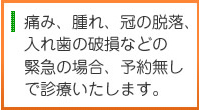
Wisdom Teeth…?
Wisdom teeth, or third molars, are permanent molar teeth, shaped for grinding food. They are the furthest back teeth in the mouth. Wisdom teeth usually erupt into the mouth between 17 and 21 years of age, but in some people they come later or never erupt. In a small proportion of people, wisdom teeth are congenitally absent.
Do they always cause problems?
No. Many people have no problems with their wisdom teeth provided that they maintain good oral hygiene.
When do wisdom teeth cause problems?
In some people there is not enough space in the mouth for the wisdom teeth and they erupt only only partly, so that the back part of the tooth is covered by the gums. This leaves a pocket over the tooth which, if not kept clean, can become infected, causing severe pain and discomfort, a condition known as pericoronitis.
In other people, the wisdom teeth remain buried in the bone and may press on the roots of the molar teeth in front of them, causing damage to the adjacent teeth. Occasionally they may become surrounded by a fluid-filled sac called a cyst. A tooth that has not erupted completely, and is hindered from erupting, is said to be impacted.
Who removes wisdom teeth?
In many cases, the removal of wisdom teeth is no different than the extraction of any other tooth and your dentist can perform the surgery. However, it is common that the position of the wisdom teeth complicates their removal. Some dentists may choose to refer you to a specialist, an oral surgeon, for further evaluation and treatment.
Is extraction of wisdom teeth particularly difficult?
Sometimes. Wisdom teeth are far back in the mouth, and if impacted, may be buried in bone. It may be necessary to have general anaesthesia and even spend a night in hospital. Frequently, however, wisdom teeth are not difficult to remove. And most people do not need to have them removed.
TELPHONE : 06-6362-0648
Monday to Friday
10:00 am – 1:00 pm / 2:00 pm – 7:30 pm









 06-6362-0648
06-6362-0648
